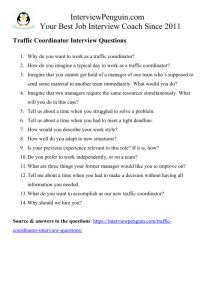The bigger the organization, the more complex everything becomes. Individuals, teams, and departments often share the same resources and materials, and someone has to ensure that everyone in the company has what they need, when they need it. You will be responsible for this as a traffic coordinator. What exactly you will coordinate, however, depends on your place of work (can be raw materials, products, people, but can be also information and data).
Your organization, time management, and problem solving skills will be tested in a job interview, together with your communication skills. In this article we will look at 13 questions you may hear from the hiring managers. Let’s start.
Table of Contents
Why do you want to work as a traffic coordinator?
Traffic coordinator certainly isn’t some fancy job title, or an occupation kids dream of having once they grow up. It would make no sense saying that you always dreamed of having this job, working as a liaison between various teams and individuals in the company, and their business partners from outside of the company.
What you can refer to, however, is how your skills and preferences match with the job description. You’ve always excelled in managing things (not people), you have great attention to detail and were born an excellent planner. You do not find it hard to communicate with anyone, and won’t get lost in a net of emails and phone calls from your colleagues.
What’s more, you enjoy this type of work–organizing and planning the traffic of materials, people, and information, and understand the importance of the job. And you always wanted to work in this field (logistics, marketing, automotive–depends on your exact place of work), and position of a traffic coordinator seems like a good stepping stone. Everything considered, at this stage of your professional career it seems like a perfect choice.
* May also interest you: Traffic Marshal interview questions.
How do you imagine a typical day in work as a traffic coordinator?
You should focus on two things in your answer: having system in your work, and spending a lot of time on the phone/email. This is what they want to hear from a good job candidate, as it reflects the reality of the job.
Say that you will have your to-do list each day, or a master database with all contacts, materials, phone calls you have to make each morning, to understand who needs what and to determine the most appropriate flow of materials in the company. It will be your start each day, to look at the documentation, to plan the steps.
Then you will spend most of your time on the call or writing emails, ensuring that different materials/data/information/labor/any other traffic gets where they need it, at each hour during the day. Of course if any problems arise–and they will–you will address them on the go.
Imagine that you cannot get hold of a manager of one team who’s supposed to send some material to another team immediately. What would you do?
Ensure the hiring managers that you will neither panic, nor give up. There are many communication channels nowadays. If you cannot get hold of them on email, you will call them. If you cannot reach them on the phone, you will storm into their office.
What’s more, after a few weeks in the company you will understand the hierarchy in different departments. There’s never just one person who can approve sending or ordering some materials. If you cannot get hold of one person, you will simply move one step up the ladder.
What I try to convey here is that you won’t remain seated in your comfy office if thing aren’t going well, waiting for a miracle, or for someone to finally call you back. You will go and try everything you can to maintain the planned material/resources flow on any given day.
Imagine that two managers require the same resources simultaneously. What will you do in this case?
When asked about conflicting priorities or multiple deadlines, you can suggest reacting with organizing a quick group call, or a short meeting. There the two managers can discuss the issue with you, and decide about the allocation of the resources.
Another option is looking at your gannt chart, or any other tool you use for coordinating the traffic in the company, and deciding on your own which request is more important at the moment, which manager should get the resources. Of course if you take this action you will give a call to the manager who didn’t get the resources and clearly explain them why.
* Special tip: You can also download the list of all questions in a one page long PDF, to practice your interview answers anytime later:

Tell us about a time when you struggled to solve a problem.
This can be anything from your previous job, school, or even from your personal life, if you happen to apply for your very first job. The key is to show that you can act independently, make decisions, and if you cannot solve the problem on your own–no shame there, you will act quickly and contact someone who can help you. We have a separate article dedicated to this question, let me take two sample answers from it:
Working as an engineer, I’ve often encountered problems I could not solve initially. In my opinion, that’s a part of my job, of a job of each good engineer–to propose questions, hypotheses, to try to improve things, not knowing how. But I did not start to panic or anything else. I simply used deduction, made some A-B tests, tested my hypothesis, and experimented on a small scale, without risking to interfere in the production. More often than not, I found the solution to the problem. And when I did not, I either consulted my colleagues or moved on to another problem.
This is my first job application, so I cannot really refer to problem I faced at work. But I remember my exam from Applied Statistics–that was a tough nut to crack. It seemed to me that I’d never pass the exam. Just I could not get my head around it. When I had my last attempt, I decided to try everything possible. I hired a tutor, I pleaded with the teacher, I asked my friends to pray for me… Silly as it may seems, it eventually worked. I passed the exam, solved the problem, and eventually graduated from the college.
Tell us about a time when you had to meet a tight deadline.
Another behavioral question, and another opportunity to demonstrate right attitude to work. It doesn’t matter what situation you narrate (preparing a report at work, or some project; getting ready for exam at school; anything else), or even whether you eventually met the deadline. The key is to demonstrate that you tried your best.
You worked overtime, you involved other colleagues (who had some free resources) to help you, in order to meet the important deadline. Eliminating all distractions and concentrating on your work with the unparalleled focus, you tried what you could to meet the deadline. Eventually you succeeded or failed–that doesn’t matter. And you will approach your new job of a traffic coordinator in the same way–always trying your best…
Other questions you may face in your traffic coordinator job interview
- How would you describe your work style?
- How well do you adapt to new situations?
- Is your previous experience relevant to this role? If it is, how?
- Do you prefer to work independently, or on a team?
- What are three things your former manager would like you to improve on?
- Tell me about a time when you had to make a decision without having all information you needed.
- What do you want to accomplish as our new traffic coordinator?
- Why should we hire you?
Conclusion, next steps
Interview for a job of a traffic coordinator belongs to interviews with average difficulty. It’s not a fancy job title, and you typically won’t compete with crowds of other applicants, as it would be the case with many other entry level jobs.
On the other hand, this is not as easy job, and you may face many tricky situation in the workplace (meeting a tight deadline, communication problems with one of the managers, heavy workload, etc). They will likely inquire about your attitude to these situations. Unless you prepare for these questions, you will find it hard to succeed. But I hope you will succeed, and wish you best of luck!
Matthew
May also interest you:
- Salary negotiation tips – Get as much as you deserve at the end of your interview – or even more.
- Time management interview questions.
- Communication skills interview questions.

